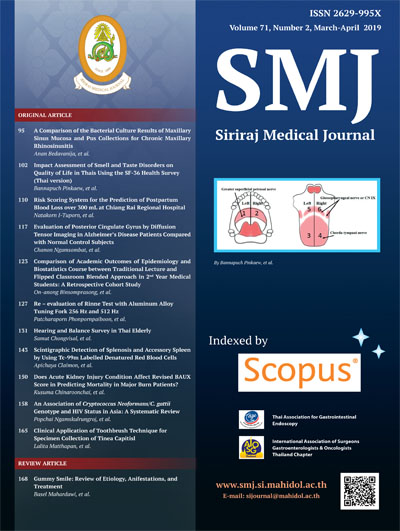Impact Assessment of Smell and Taste Disorders on Quality of Life in Thais Using the SF-36 Health Survey (Thai version)
DOI:
https://doi.org/10.33192/Smj.2019.16Keywords:
Impact assessment; smell and taste disorders; quality of life; QoL; Thai population; SF-36 Health Survey (Thai version)Abstract
Objective: Smell and taste defects adversely affect both physical and mental health. The Short Form (SF)-36 Health
Survey is a widely used tool for the quality of life (QoL) assessment. The aim of this study was to investigate the
impact of smell and taste disorders on QoL in Thais using the SF-36 Health Survey (Thai version).
Methods: This retrospective chart review included the patients with smell and taste disorders that attended our
clinic during 2011 to 2016. Smell ability was evaluated by phenyl ethyl alcohol odor detection threshold, and smell
discrimination and identification tests. Taste ability was evaluated by electrogustometry, regional testing, and
modified taste strips. SF-36 was used to assess QoL.
Results: Three hundred fifty-five patients were included in the final analysis. The mean age was 50.8±15.5 years,
and 64.2% were female. Most patients (78.59%) had smell disorder only, 15.78% had taste disorder only, and 5.63%
had both disorders. Specific to taste disorders, QoL was significantly lower in the patient group than in healthy
population for the following 6 domains: physical function, role-physical, bodily pain, general health, vitality, and
role-emotional (all p<0.05).
Conclusion: The four major causes of smell and taste disorders are nasal/sinonasal diseases, idiopathic causes,
post-URI, and head trauma. Women are more often affected than men. Although smell and taste disorders both
adversely affect physical and mental health, the taste disorders cause more adverse effect. An assessment tool that is
specific to smell and taste disorders may facilitate more detailed elucidation of the effect of these conditions on QoL.
Downloads
Published
How to Cite
Issue
Section
License
Authors who publish with this journal agree to the following conditions:
Copyright Transfer
In submitting a manuscript, the authors acknowledge that the work will become the copyrighted property of Siriraj Medical Journal upon publication.
License
Articles are licensed under a Creative Commons Attribution-NonCommercial-NoDerivatives 4.0 International License (CC BY-NC-ND 4.0). This license allows for the sharing of the work for non-commercial purposes with proper attribution to the authors and the journal. However, it does not permit modifications or the creation of derivative works.
Sharing and Access
Authors are encouraged to share their article on their personal or institutional websites and through other non-commercial platforms. Doing so can increase readership and citations.















